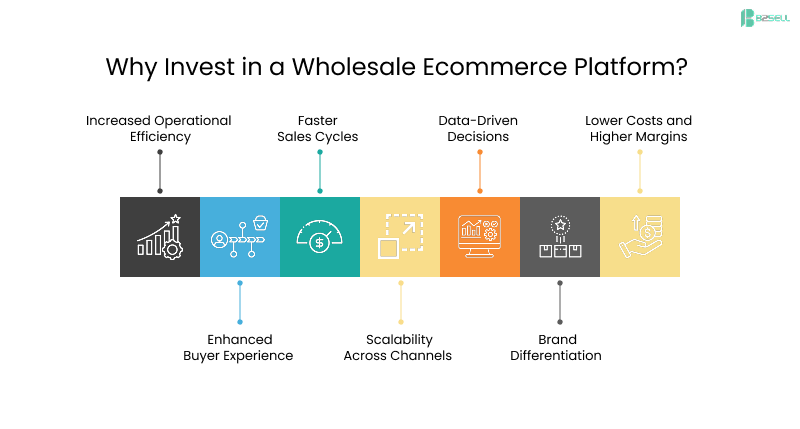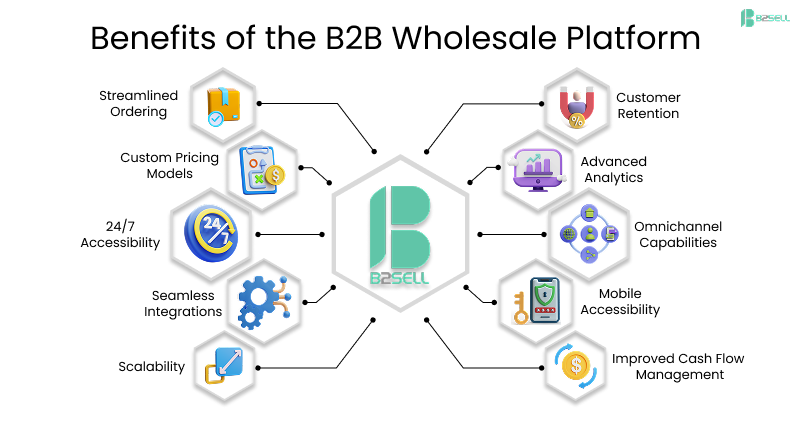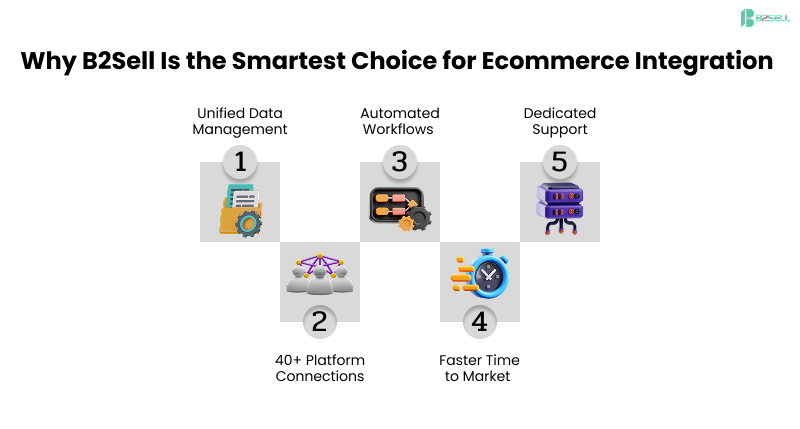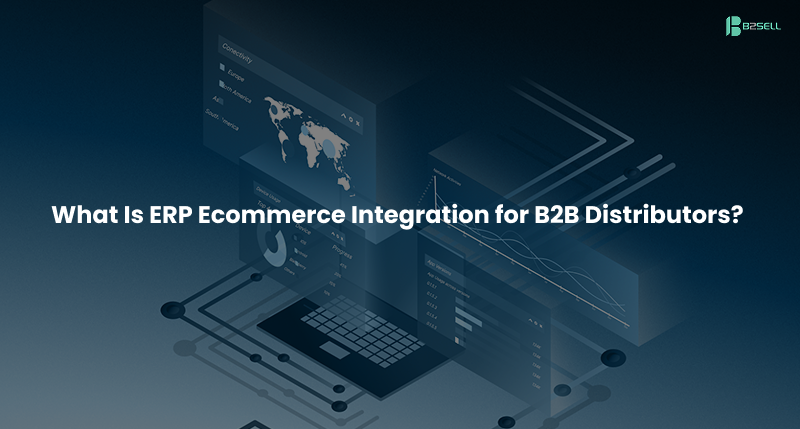Best Wholesale Ecommerce Platform: Why Wholesale Ecommerce Is Booming in 2026
In today’s fast-paced digital landscape, B2B wholesale ecommerce has shifted from a competitive advantage to a business necessity. As businesses adapt to shifting buyer behaviors, technological advancements, and the demand for seamless, self-serve experiences, the need for robust wholesale ecommerce platforms has never been greater. By 2025, the global B2B ecommerce market is expected to surpass $20.9 trillion, with wholesale ecommerce emerging as a key driving force behind this growth.
Whether you're a distributor, manufacturer, or wholesaler, finding the best B2B ecommerce platform can significantly enhance your scalability, streamline operations, and boost online revenue.
This ultimate guide explores how B2B wholesale ecommerce works, why investing in the right platform matters, the types of wholesalers in B2B, and a curated list of the best wholesale ecommerce platforms for 2026—ending with an expert guide to leveraging B2Sell for seamless ecommerce integration.
How Does B2B Ecommerce Wholesale Work?
Wholesale ecommerce in the B2B sector refers to digital platforms that facilitate bulk purchasing and selling of products between businesses. Unlike B2C (Business-to-Consumer), B2B wholesale ecommerce focuses on larger order volumes, negotiated pricing, tiered pricing models, account-based experiences, and credit-based purchasing.
Key features include:
- Bulk Ordering
- Custom Pricing & Discounts
- Multiple Buyer Roles/Accounts
- Quote Management Systems
- Payment via Invoicing/Net Terms
B2B Ecommerce Examples:
- Distributors selling electrical components to retailers
- Manufacturers supplying automotive parts to dealers
- Wholesalers providing healthcare supplies to hospitals
B2B ecommerce solutions must therefore be tailored for complex procurement needs, integrations with ERP/CRM systems, and personalized buying experiences.
Why Invest in a Wholesale Ecommerce Platform?
Choosing the right B2B ecommerce platform can drive substantial business growth. Here's why you should invest:

1. Increased Operational Efficiency
Automate manual tasks like order processing, invoicing, and customer management, reducing errors and overhead.
2. Enhanced Buyer Experience
Provide personalized, account-specific pricing, detailed product catalogs, and flexible payment options to meet the evolving expectations of modern B2B buyers.
3. Faster Sales Cycles
Accelerate the traditional sales process with real-time product availability, online quotes, and instant reordering capabilities.
4. Scalability Across Channels
Multichannel and omnichannel commerce support ensures your business can sell across web, mobile, marketplaces, and B2B portals seamlessly.
5. Data-Driven Decisions
Use advanced analytics to streamline inventory management, fine-tune pricing strategies, and improve customer segmentation for smarter decision-making.
6. Brand Differentiation
With branded portals and self-service portal dashboards, wholesalers can differentiate themselves in a competitive digital market.
7. Lower Costs and Higher Margins
Reducing reliance on manual sales processes and intermediaries helps companies boost efficiency and increase profitability.
What Are the Different Types of Wholesalers in B2B Commerce?
Understanding your wholesale business model helps in choosing the right platform. Types of wholesalers include:
1. Merchant Wholesalers
Buy and stock goods in bulk, then resell to retailers or other B2B buyers. Most common form of wholesaling.
2. Brokers and Agents
Facilitate sales between manufacturers and buyers, earning commission but not handling inventory.
3. Manufacturers
Sell directly to B2B buyers with the ability to offer bulk discounts and volume-based pricing incentives.
4. Distributors
They represent manufacturers and sell to retailers. Robust catalog management and partner portals are crucial.
What Are the Real Benefits of the B2B Wholesale Platform?

1. Streamlined Ordering
Buyers can place large-volume orders quickly through digital catalogs, bulk-order forms, or automated reordering tools.
2. Custom Pricing Models
Set pricing by customer tier, quantity, order history, contract, or region. This drives loyalty and repeat purchases.
3. 24/7 Accessibility
Enable round-the-clock order placements, increasing convenience for international buyers and mobile-first clients.
4. Seamless Integrations
Sync with your ERP (NetSuite, SAP), CRM (Salesforce, HubSpot), PIM (B2Sell PIM), accounting, and logistics tools.
5. Scalability
Start small and scale globally without platform limitations. Easily scale your operations by adding unlimited SKUs, users, sales channels, and system integrations.
6. Customer Retention
Provide personalized experiences with loyalty programs, reward points, customer-specific catalogs, and intuitive reordering.
7. Advanced Analytics
Use dashboards and reports to track top buyers, forecast demand, optimize stock, and make strategic decisions.
8. Omnichannel Capabilities
Sync wholesale sales with marketplaces, direct-to-consumer (D2C) storefronts, mobile apps, and distributor networks.
9. Mobile Accessibility
Support mobile-first commerce with responsive ordering portals, native apps, and on-the-go tracking for field reps.
10. Improved Cash Flow Management
Automated payment reminders, credit limit tracking, invoices, and integrations with payment gateways and accounting systems.
How Can You Choose the Right B2B Wholesale Platform for Your Business?
Selecting the best platform for your wholesale operation is a strategic decision that requires analyzing your current and future business needs. Here’s an in-depth guide to the essential features you should look for:
1. Customization and Flexibility
- Deliver personalized catalogs, dynamic pricing, and targeted promotions tailored to specific customer segments.
- Support for multilingual, multi-currency, and multi-location capabilities is essential.
- Ensure the platform allows you to define custom workflows for order approvals, purchase limits, or credit terms.
2. Integration Capabilities
- Seamless integration with ERP systems like NetSuite, SAP, or Microsoft Dynamics is critical.
- Look for CRM and PIM compatibility (e.g., Salesforce, B2Sell PIM) to centralize data.
- Platforms with API-first or prebuilt connectors reduce integration time and cost.
3. Scalability
- The platform should support thousands of SKUs, high traffic, and order volume.
- Should support multiple warehouses with real-time global inventory synchronization.
- Scalable hosting (cloud or hybrid) ensures fast performance as your business grows.
4. User Experience and Interface
- Admins need a simple backend to manage content, orders, and workflows.
- Modern B2B buyers expect fast search capabilities, user-friendly navigation, and seamless account self-service options.
- Mobile-responsive and optimized UX enhances conversion and retention.
5. Security, Compliance, and Permissions
- Ensure SSL encryption, role-based access, and two-factor authentication.
- Compliance with GDPR, PCI DSS, and SOC 2 is non-negotiable.
- Add layered controls like order approvals and user roles per customer account
6. Mobile Optimization
- Mobile-friendly platforms allow buyers and field reps to place and track orders on the go.
- Native B2B mobile apps boost customer loyalty and provide added convenience for on-the-go purchasing.
7. Support, Documentation & Partner Ecosystem
- Ensure the platform offers 24/7 support, dedicated onboarding assistance, and comprehensive training resources for your team.
- Strong developer and integration partner ecosystem is a plus.
- Platforms like B2Sell offer long-term support and tailored enhancements.
8. Total Cost of Ownership (TCO)
- Consider not just licensing, but also hosting, customization, maintenance, integration, and scaling costs.
- SaaS platforms typically offer predictable monthly costs while open-source solutions require in-house dev teams.
6 Leading B2B Wholesale Platforms to Accelerate Your Online Revenue Growth in 2026
Here’s an in-depth comparison of the leading B2B wholesale ecommerce platforms to consider in 2026. Each of these solutions is built to address the core needs of wholesale businesses, offering distinct advantages based on business size, industry, and integration needs.
1. B2Sell
Best for: Seamless ERP/CRM/PIM integrations and B2B-specific ecommerce capabilities
B2Sell is a purpose-built wholesale ecommerce platform designed for manufacturers, distributors, and suppliers. It offers end-to-end integrations with systems like NetSuite, SAP, Salesforce, QuickBooks, and Magento. The platform is ideal for businesses that need a centralized solution to manage product data, orders, customer relationships, and multichannel selling.
Top Features:
- Deep ERP, CRM, and PIM integration
- Multi-currency and multi-warehouse support
- Advanced pricing and contract-based discounting
- Real-time stock availability and customer-specific catalogs
- Bulk order forms, recurring orders, credit management
- Customizable frontend with mobile-first design
Why Choose B2Sell?
- Scalable to global operations
- Strong support and onboarding
- Unified data synchronization reduces manual errors, streamlines workflows, and significantly improves overall operational efficiency.
2. Magento Commerce (Adobe Commerce)
Best For: Enterprises seeking a highly customizable ecommerce solution
Magento Commerce is a robust open-source platform equipped with powerful B2B extensions and extensive customization capabilities. It’s perfect for businesses with dedicated development teams that require complete control over their ecommerce infrastructure.
Top Features:
- Robust B2B modules for quotes, requisitions, and buyer roles
- Tiered pricing and shared catalogs
- Integration with Adobe’s Experience Cloud
- Multi-storefront and headless commerce capabilities
Limitations:
- Steep learning curve
- Higher development and maintenance costs
3. Shopify Plus
Best for: Fast-growing B2B companies seeking ease of use and quick setup
Shopify Plus extends Shopify’s well-known B2C features to wholesale businesses through apps and custom scripts. It’s a user-friendly SaaS platform with strong uptime and robust payment processing capabilities.
Top Features:
- Wholesale channel for B2B ordering
- Custom pricing by customer group
- Integration with third-party ERP and CRM systems
- Secure checkout and mobile-first design
Limitations:
- May lack native B2B depth for enterprise-scale needs
- Reliant on apps for advanced functionality
4. BigCommerce B2B Edition
Best For: Businesses looking for a flexible SaaS solution with headless commerce capabilities
BigCommerce B2B Edition is a SaaS platform tailored for both B2C and B2B operations. It offers a low-code environment, headless commerce support, and integration with ERPs like Acumatica and NetSuite.
Top Features:
- Price lists, company accounts, and custom catalogs
- Punchout capabilities for procurement systems
- Sales rep masquerading tools
- Open APIs for full customization
Strength:
- Fast time to market, affordable pricing tiers
5. NetSuite SuiteCommerce
Best for: Businesses already using NetSuite ERP
SuiteCommerce integrates natively with NetSuite’s cloud ERP, allowing businesses to run ecommerce, finance, inventory, and operations on one system. It’s particularly well-suited for companies looking to unify their operations across sales, inventory, and customer management in a single platform.
Features:
- Unified platform for ecommerce and back-office
- Real-time inventory, pricing, and customer data
- B2B portals with account-specific access
- Automated tax, invoicing, and payment processing
Considerations:
- Limited flexibility compared to open-source platforms
- Pricing may vary based on ERP licensing
6. Handshake by Shopify
Best for: Small businesses and startups entering wholesale ecommerce
Handshake is Shopify’s curated wholesale marketplace, ideal for small brands selling to retailers. While it’s not a standalone ecommerce store builder, it’s an excellent platform for reaching a pre-qualified wholesale audience.
Top Features:
- Connects suppliers with verified retailers
- Streamlined product listings
- Order and payment processing built into Shopify ecosystem
Best Use:
- Supplement your ecommerce sales by joining a wholesale network
Frequently Asked Questions (FAQs) on B2B Wholesale Platforms
What is a B2B wholesale platform?
A B2B wholesale platform is an ecommerce solution designed for businesses selling products in bulk to other businesses. These platforms support custom pricing, account-based shopping, and high-volume transactions.
What is a B2B ordering platform?
It serves as a digital portal that allows B2B buyers to place and manage bulk orders, view personalized catalogs, and track shipments in real time.
Which B2B platform is best?
It depends on your needs Magento Commerce, OroCommerce, and BigCommerce are top platform choices for B2B wholesale ecommerce—while for seamless integrations, B2Sell emerges as a standout solution.
Which platform is best for wholesale business?
Platforms like Shopify Plus, Magento, and NetSuite SuiteCommerce provide excellent scalability, while B2Sell enhances these systems with integration tools.
What is the most popular B2B wholesale marketplace?
Alibaba and Global Sources lead the global marketplace category, while industry-specific platforms like Faire and Abound are gaining traction.
Can I use Shopify or WooCommerce for B2B?
Yes. With the right extensions or plugins, both Shopify Plus and WooCommerce B2B can support complex B2B requirements.
What are some B2B ecommerce examples?
- Industrial equipment suppliers selling to construction companies
- Food wholesalers supplying to restaurants and grocery chains
- Apparel brands distributing bulk clothing to retail outlets
Final Thoughts: Best B2B Wholesale Platform Guide
Choosing the right wholesale ecommerce platform isn’t just about technology—it’s a strategic move that shapes the future growth and success of your business.With robust, scalable platforms in place, businesses can Deliver exceptional customer experiences, lower operational costs, and strengthen your competitive advantage.
Whether you're starting from scratch or optimizing an existing system, you need scalable, integrable, and user-friendly ecommerce platforms to stay competitive in 2026.
Bonus Guide: Why B2Sell Is the Smartest Choice for Ecommerce Integration
If you already use platforms like Magento, Shopify, NetSuite, Salesforce, or Sage, integrating them effectively is key to maximizing performance.
B2Sell Integrations offer:

- Unified Data Management: Seamlessly synchronize product, customer, and order data across all platforms and systems for consistent, error-free operations.
- 40+ Platform Connections: From ERPs and CRMs to PIMs and ecommerce platforms
- Automated Workflows: Reduce manual work, improve accuracy
- Faster Time-to-Market: Launch new sales channels quicker
- Dedicated Support: From implementation to post-launch maintenance
Whether you're running a multichannel ecommerce platform or expanding omnichannel commerce strategies, B2Sell helps you operate more efficiently, with less friction and greater visibility.
Ready to Scale?
Streamline your B2B wholesale business with seamless ecommerce integrations. Learn more about B2Sell Integrations and take the next step towards digital transformation.
Want the ultimate B2B ecommerce experience? - B2Sell.com

.png)
.png)




.png)